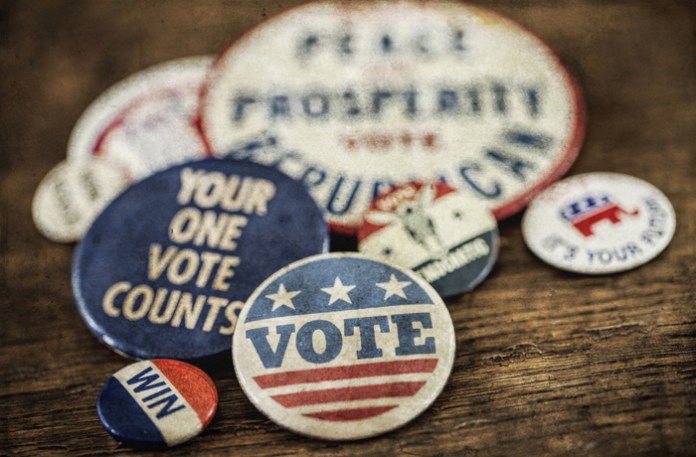Until it closed last year, Monarch Novelties was the only souvenir store in Washington, D.C., that sold campaign memorabilia exclusive to the three presidential elections of the 1960s. The store was an oddity, a decaying building on 14th Street that, for more than 80 years, trafficked in eccentricities: not just Kennedy– and Nixon-era nostalgia but also carnival trinkets, defective bingo sets, and false teeth. It was one of the last remaining fixtures of a weirder, seedier side of the city that urban revitalization has all but wiped out in the last two decades.
Monarch was owned and staffed by Douglas Robinson, one of 11 children in a sprawling Catholic family, all of whom were brought up in the carnival business. Robinson lived above the store, and his health was poor. All day, he sat by the front door, which he kept locked. He only allowed in customers who rang the bell, promised not to take pictures of his merchandise, and paid in cash. For decades, he refused to sell the store, despite many offers. When he changed his mind last year, he passed the place on to Drew Mitchell, a trusted neighbor who, in a statement, promised to “bring the Monarch building back to its original beauty while also preserving its unique, rich history and character.”
However, once he acquired the building, Mitchell had a problem: unloading Monarch’s stock, which Robinson had not significantly updated since the late 60s. (He had essentially been holed up inside since the devastating riots in 1968 that briefly turned 14th Street into a warzone following the assassination of Martin Luther King Jr.) So, this August, Mitchell announced a one-day-only sale — call it a tourist trap — where, for the first time in decades, the doors of Monarch would be thrown open to anyone who wanted to pick over the detritus of a lifetime.

Word spread quickly, and on the day of the sale, a line of curious people stretched all the way down the block. From inside the store volunteer cashiers passed along freebies to those standing on the street. I watched as a large cardboard poster came my way. When it reached the off-duty police officer standing in front of me, he looked at the souvenirs fastened to its front and exclaimed “tie bars!” with surprised delight. I clipped several to my shirt before handing the board down the line. The woman behind me had to explain to her boyfriend what exactly a tie bar was. Inside, there were hundreds more heaped on the floor.
The store was so packed that it was hard to move around among the shelves. The air conditioning, which rarely ran during Robinson’s tenure, was working overtime, but still it felt stuffy and claustrophobic. The accumulated clutter of Robinson’s life was messily laid out on tables: the store’s inventory, of course, but also many of his personal belongings, including dishes, books, and old LPs. He seemed to have a taste for easy listening. A quick flip through the records brought up albums from Barbra Streisand, Joan Baez, and Linda Ronstadt. All throughout the day, people walked out laden with knickknacks. For my own part, I picked up a dusty can of Gold Medal Flossine, a cotton candy sweetener manufactured during the Eisenhower administration. Others grabbed baskets of rubber ducks, stuffed animals, or novelty buttons.
In the back, volunteers were dealing with the campaign memorabilia from behind a counter. This was the primary draw for most of us. Robinson had mounds of Lyndon B. Johnson pennants, piles of John F. Kennedy campaign buttons, and stacks of Richard Nixon portraits (labeled by Mitchell’s team as “Dick pics”). He even had some material left over from Barry Goldwater’s ill-fated 1964 campaign. The counter was mobbed, and the memorabilia was cleaned out by noon.
While the eager collectors rushed in, I hung back, reflecting on the manner in which Robinson came by such a strange line of goods. A few years ago, when I worked at an office near Monarch, I was a regular at the store and sometimes fell into conversation with Robinson about his childhood. The campaign material fascinated me, and I remember Robinson laughing when I asked if he had anything more recent. “That stuff is too new for me,” he said, referring to my request for a George W. Bush bumper sticker. “Go somewhere else for that up-to-date stuff.”
RETROFUTURISM WITH A SIDE OF FRIES: REVIEWING ELON MUSK’S LA TESLA DINER
In the early 60s, Robinson continued, his father had a friend, Jimmy Piccolo, an Italian who was also in the souvenir business. His store was on Pennsylvania Avenue, near the National Mall, in a line of shops that no longer exists. The whole block was seized by the federal government at the end of that decade for the construction of the FBI headquarters. Piccolo’s shop, along with the bars and burlesque clubs, was forced to relocate. Many business owners found other places in the city, but not Piccolo. He thought the district was changing, for the worse, and he couldn’t bear the decline. Like many people in that period, he fled to the suburbs.
Before Piccolo left, he sold his remaining stock to Robinson’s father, who put it away in storage. His son slowly brought it back out over the years, knowing that there would come a day when people might find some sentimental value in the trivial artifacts of the past. Those days came, and now they have gone.
Nic Rowan is managing editor of The Lamp magazine.
